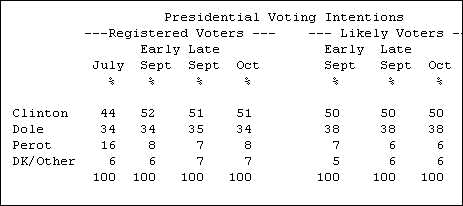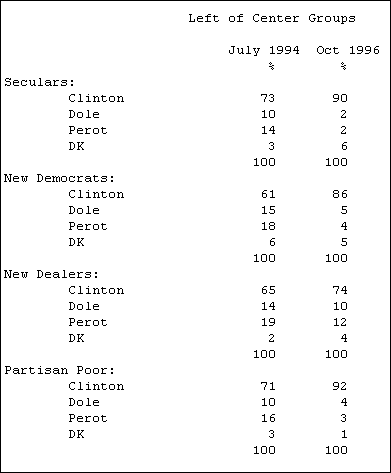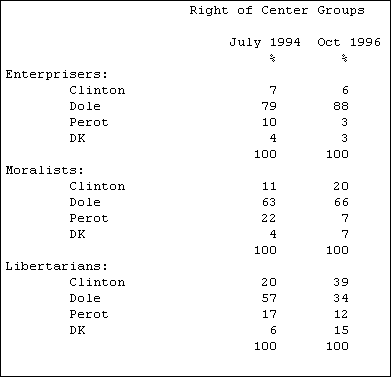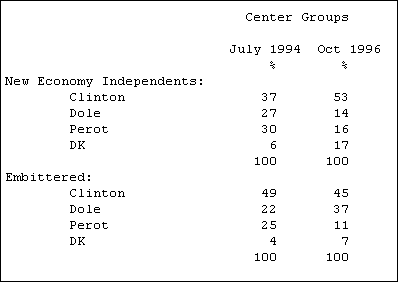Introduction and Summary
After two presidential debates and six weeks of the general campaign Bill Clinton’s lead over Bob Dole is as large as it was in early September. The course of the race has changed little with the passing of each important campaign milestone. The only observable consequence of the debates is that the percentage of voters who say they might switch to Bob Dole is lower than it was just prior to the first debate (11% vs. 16%). The Pew voter typology, which divides the electorate by core values, finds Dole unable to forge a coalition of staunch conservatives, moderates and populists.

The unchanged standings also reflect the breadth of the Clinton coalition. The President is getting strong support from the left, right and center of his own party and has won over working class Independents who had big doubts about him as recently as a year ago.
In stark contrast, Dole has not only failed to attract Independents, but he has been unable to rally key Republican segments. His support is weak among economically squeezed populist conservatives. He has also turned off moderate economic conservatives, with whom Bill Clinton has made inroads. Dole only gets overwhelming support from Republicans who are both economically and socially conservative.
The Pew Research Center’s voter classification system (typology) categorizes voters based on their political values, party affiliation, and political participation into ten groups — four Democratic, three Independent and three Republican. In the summer of 1994 when voter support was about equally divided between Clinton (39%) and Dole (36%), and when Perot had a larger following (20%), moderate Democratic groups were not enthusiastic about the President.[1. The typology is described in an appendix to this report (see “About the Typology”).
But in the current survey, right-of-center Democrats give Clinton a strong vote of confidence. Fully 86% of moderate New Democrats say they would vote for Clinton if the election were being held today, as do 74% of older, socially conservative New Dealers. More liberal groups are even more enthusiastic. Nine out of ten voters among the liberal Seculars and among the disadvantaged Partisan Poor favor Clinton.
A profile of left of center groups in this election follows.
- New Democrats(moderate on economic issues, strong environmentalists) Clinton has gained 25 % points with this group since 1994. Opinions of Dole have turned sharply negative (62% unfavorable now vs. 34% in 1994). Clinton is not seen as weak on personal character. His record and presidential attributes impress this group.
- New Dealers (older, unionist, socially conservative) Clinton’s support is weakest and hostility to him strongest (23% unfavorable) here among all Democratic groups. But New Dealers have also turned against Dole (80% unfavorable, vs. 43% in 1994). The character issue dogs Clinton with this group, but he wins points on Medicare (by 57% to 5%, they prefer his position over Dole’s). A key attraction for many is that Clinton sidetracked GOP Congressional efforts. New Dealers, who often defected to Ronald Reagan, are the Democratic group least satisfied with the quality of the presidential candidates this year. One in three (30%) would prefer a GOP Congress if Clinton is re-elected.
- Seculars (tolerant, progressive, low religious practice) These affluent liberals are most likely to cite party (perhaps a surrogate for ideology) as their main reason for backing Clinton. Worried that health care, education and other social issues are being overlooked, Seculars prefer Clinton over Dole on Medicare by a margin of 65% to 4%. Three-quarters (74%) think Dole’s tax cut would be the wrong thing for the country. The group is most likely to express anti-incumbent sentiment in the race for Congress.
- Partisan Poor (disadvantaged, pro-social welfare) This reliably Democratic group now supports Clinton at the same level as it does Democratic Congressional candidates (90%). It cares little about the character issue. Instead, like New Dealers, it is more likely to prefer Clinton because he stymied GOP
- Congressional efforts. Economically anxious and concerned about the safety net, this group prefers Clinton’s position on Medicare over Dole’s, 73% to 6%.

Fractious Republicans
There is much less unity among Republican groups. Only two in three populists (Moralists) are backing Dole. The former Senate Majority leader has actually lost a lot of ground among Libertarians since 1994, and is trailing Clinton among them. However, hardcore conservatives, who intensely dislike the President, are solidly behind Dole.
Enterprisers (affluent economic and social conservatives) This is one of two groups in which Dole has gained ground since 1994. Although strongly anti-Clinton (61% very unfavorable opinion), even this classic GOP group lacks enthusiasm for the GOP presidential nominee: nearly half (44%) say they are voting for Dole mainly because they don’t like his opponents. Enterprisers are the only group in the electorate with a majority (61%) believing the Dole tax cut is good for the country.
Moralists (social conservatives, critical of big business and big government) The most economically anxious group among Republicans, Moralists are not convinced they will be better off with Dole in the White House. They don’t think a 15% tax cut would be good for the country. They believe labor unions and business corporations have too much influence on who becomes President (57% and 62%, respectively). One-in-three (33%) have very unfavorable views of the President.
Libertarians (socially tolerant, conservatives) These moderates are unimpressed by Dole and his tax proposal. In fact, more of them have a favorable opinion of Clinton than Dole (53% vs. 35%), and more believe a 15% tax cut would be the wrong rather than the right thing for the country (50% vs. 40%). Moral appeals and Clinton’s character problems have little impact on Libertarians. Two-thirds (67%) say Clinton’s record is what matters most, while only 16% think character is most important. Among Republican groups Libertarians feel most strongly that churches have too much influence on who gets elected President.

Independents
While party unity and the lack of it are big factors in the race, the President’s success in wooing the working class Independents represents the biggest percentage turn around since 1994. Perhaps with an assist from GOP Congressional leader Newt Gingrich, he has succeeded with the waitress moms and double shift dads who have no firm anchor in either party. Clinton has also held his own with the most distrustful and alienated voter group, the Embittered, whose natural tendency is to vote against incumbents.
New Economy Independents (middle income, weak party ties, female, mixed liberal/conservative values)
These voters are far more likely to have favorable views of Clinton than Dole now (63% vs. 26%), whereas two years ago the two men were rated about evenly (Clinton 58%, Dole 54%). Economic anxiety remains high among them. They worry about the social safety net; by a margin of 47% to 11%, they prefer Clinton’s approach to Medicare over Dole’s. They want to hear more from the candidates about social issues, including education and health care. In their view, Clinton’s presidential character (i.e. performance in office) outweighs concerns about his personal character. They give Clinton a big edge over Dole as the candidate who would use good judgment in a crisis (58% vs. 22%), is a strong leader (53% vs. 26%), cares about people like me (50% vs. 19%) and shares my values (49% vs. 28%).
The Embittered (cynical, distrustful, low income) A majority of this group holds an unfavorable opinion of both presidential candidates. It is the only non- Republican group in which Dole appears to have gained any ground since 1994. Attacks on Clinton’s character have taken a toll on Clinton’s image in this group, which is economically pressured and supports Dole’s 15 % tax cut proposal.
